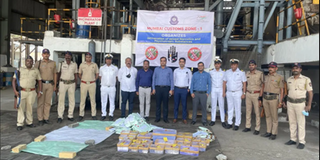Premium
Kenyan arrested in India over smuggling Sh270m cocaine

Mumbai custom officers stand in front of seized drugs at the airport.
A Kenyan has been arrested for allegedly trying to smuggle cocaine worth Sh270 million ($2.1 million) in India.
Indian customs officials at Chhatrapati Shivaji Maharaj International Airport said they arrested the female suspect on Tuesday, April 1, with the drugs in her luggage.
Emily Kanini Rodha, 43, was detained on arrival at CSMI Airport, Mumbai. She had flown from Nairobi through Doha.
Officials said she raised suspicions that she might be carrying some contraband because of her nervousness.
“During the examination of the trolley bag carried by her, the officers observed that it contained clothes and shoes. However, after removing all the contents of the said bag, the officers found the bag unusually heavy and on further examination, it was found that some synthetic material was affixed on the bottom side,” read part of the customs statement.
“On removing the said material, 04 transparent plastic packets were found glued to the bottom surface of the said trolley bag. All packets contained white powdered substance, which tested positive for the presence of Cocaine, a narcotic drug. We seized a total of 1,789 grams of cocaine from the passenger.”
During interrogation, Ms Kanini reportedly said the drugs were handed over to her by a woman named Millicent in Nairobi.
“Rodha has admitted that she was aware of the contents of the bag and she had been promised Sh100,000 ($775) if she successfully smuggled the drugs to India,” she reportedly told the customs officials.
'Quick, easy money'
“She was to be given Sh100,000 in Delhi for the successful delivery of the drugs to some accomplice of Millicent. Since she was in need of money, she accepted the offer of Millicent to earn some quick, easy money,” the officials added.
Ms Kanini, who was arrested for violating the Indian Narcotic Drugs and Psychotropic Substances (NDPS) Act, told authorities Millicent had also booked her flight ticket and accommodation while in Mumbai.
Investigators believe Rodha was working for a larger drug syndicate operating between Africa and India.
“We suspect this is part of a wider network. Efforts are underway to identify her accomplices,” the official said.
In India, cocaine is among banned substances and transporting or selling it is illegal.
Penalties for offenders often vary depending on the amount of drugs one is found with. They include up to six months in jail or a fine when found with less than a kilo to more than 20 years in jail with a fine if found with what authorities can assess as a “commercial quantity.”
However, offences related to drug trafficking cannot be suspended, remitted or commuted.
Her arrest comes less than a month after another Kenyan woman was sentenced to death in Vietnam for drug trafficking. Margaret Nduta, 37, was condemned for smuggling over 2.3 kg of cocaine through Ho Chi Minh City's Tan Son Nhat International Airport.
The HCMC People’s Court handed down the death sentence to Nduta on March 6, following her arrest in July 2023. Authorities discovered the drugs—valued at approximately Sh27 million on the international market—concealed in her luggage upon arrival.
Court documents revealed that Nduta had been recruited by a Kenyan man named John to transport a suitcase to Laos in Southeast Asia. She was instructed to deliver the luggage to an unnamed woman and return with unspecified "goods." In exchange, John paid her $1,300 (around Ksh167,700) and covered her flight expenses.
The Kenyan government has since announced it was working to have her death sentence commuted to imprisonment after public pressure.





